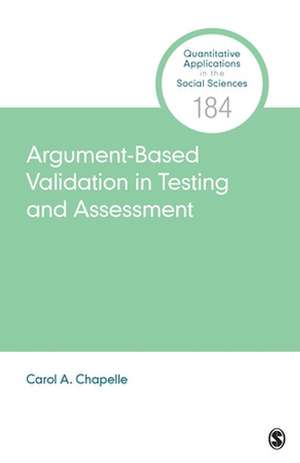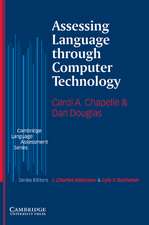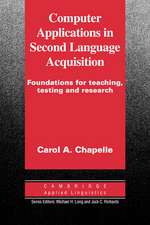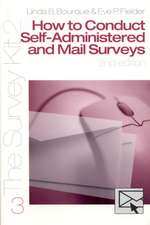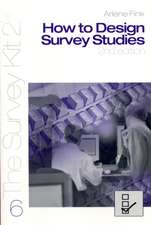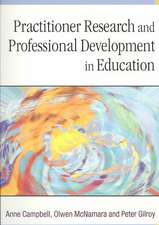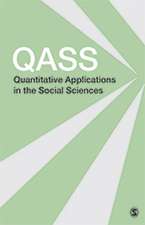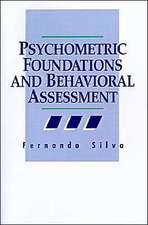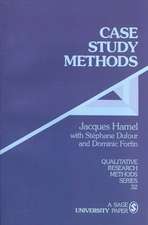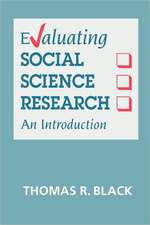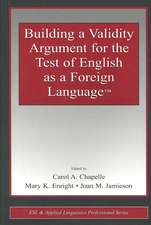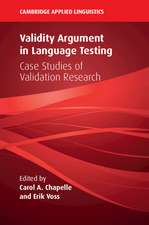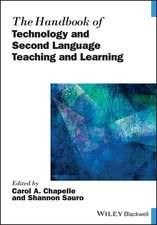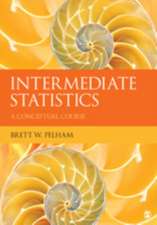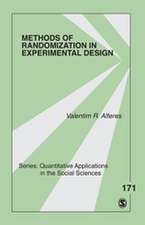Argument-Based Validation in Testing and Assessment: Quantitative Applications in the Social Sciences, cartea 184
Autor Carol A. Chapelleen Limba Engleză Paperback – 30 apr 2020
Din seria Quantitative Applications in the Social Sciences
-
 Preț: 306.08 lei
Preț: 306.08 lei -
 Preț: 270.02 lei
Preț: 270.02 lei -
 Preț: 270.25 lei
Preț: 270.25 lei -
 Preț: 274.06 lei
Preț: 274.06 lei -
 Preț: 270.29 lei
Preț: 270.29 lei -
 Preț: 304.51 lei
Preț: 304.51 lei -
 Preț: 304.83 lei
Preț: 304.83 lei -
 Preț: 313.80 lei
Preț: 313.80 lei -
 Preț: 305.60 lei
Preț: 305.60 lei -
 Preț: 306.14 lei
Preț: 306.14 lei -
 Preț: 273.46 lei
Preț: 273.46 lei -
 Preț: 275.42 lei
Preț: 275.42 lei -
 Preț: 277.33 lei
Preț: 277.33 lei -
 Preț: 305.05 lei
Preț: 305.05 lei -
 Preț: 305.32 lei
Preț: 305.32 lei -
 Preț: 304.77 lei
Preț: 304.77 lei -
 Preț: 305.05 lei
Preț: 305.05 lei -
 Preț: 304.51 lei
Preț: 304.51 lei -
 Preț: 304.51 lei
Preț: 304.51 lei -
 Preț: 305.60 lei
Preț: 305.60 lei -
 Preț: 304.77 lei
Preț: 304.77 lei -
 Preț: 306.14 lei
Preț: 306.14 lei -
 Preț: 306.34 lei
Preț: 306.34 lei -
 Preț: 305.40 lei
Preț: 305.40 lei -
 Preț: 306.41 lei
Preț: 306.41 lei -
 Preț: 304.77 lei
Preț: 304.77 lei -
 Preț: 305.60 lei
Preț: 305.60 lei -
 Preț: 269.91 lei
Preț: 269.91 lei -
 Preț: 304.51 lei
Preț: 304.51 lei -
 Preț: 289.18 lei
Preț: 289.18 lei -
 Preț: 287.82 lei
Preț: 287.82 lei -
 Preț: 316.12 lei
Preț: 316.12 lei -
 Preț: 288.96 lei
Preț: 288.96 lei -
 Preț: 316.71 lei
Preț: 316.71 lei -
 Preț: 314.98 lei
Preț: 314.98 lei -
 Preț: 317.26 lei
Preț: 317.26 lei -
 Preț: 314.60 lei
Preț: 314.60 lei -
 Preț: 289.95 lei
Preț: 289.95 lei -
 Preț: 289.18 lei
Preț: 289.18 lei -
 Preț: 315.36 lei
Preț: 315.36 lei -
 Preț: 314.98 lei
Preț: 314.98 lei -
 Preț: 314.38 lei
Preț: 314.38 lei -
 Preț: 316.33 lei
Preț: 316.33 lei -
 Preț: 316.51 lei
Preț: 316.51 lei -
 Preț: 314.76 lei
Preț: 314.76 lei -
 Preț: 288.41 lei
Preț: 288.41 lei -
 Preț: 316.51 lei
Preț: 316.51 lei
Preț: 305.28 lei
Nou
58.42€ • 60.27$ • 49.45£
Carte disponibilă
Livrare economică 11-25 februarie
Livrare express 25-31 ianuarie pentru 24.01 lei
Specificații
ISBN-10: 1544334486
Pagini: 160
Dimensiuni: 140 x 216 x 10 mm
Greutate: 0.2 kg
Ediția:1
Editura: SAGE Publications
Colecția Sage Publications, Inc
Seria Quantitative Applications in the Social Sciences
Locul publicării:Thousand Oaks, United States
Recenzii
This text address complex philosophical discussions related to validity and reliability in an accessible way. It models a way of thinking about assessment decisions that many of our students need to be successful in their future work!
Cuprins
List of Figures
Series Editor’s Introduction
Preface
Acknowledgments
About the Author
Chapter 1: What Is Argument-Based Validity?
Introducing Argument-Based Validity
The Academic Tradition of Validity
Evolving Concepts in Testing
Conclusion
Chapter 2: Validity Argument Design
Expressing Interpretations and Uses: Three Example Tests
Using Claims and Inferences to Express Interpretations and Uses
Structuring Claims in a Validity Argument: From Grounds to Conclusions
Identifying Evidence: Warrants, Assumptions, and Backing
Identifying Weaknesses and Limitations in Arguments: Rebuttals
The Language of Validity Argument
Chapter 3: Uses and Consequences of Test Scores
Why Start With Use and Consequences?
Inferences About Use and Consequences
Iowa Assessments: Warrants for Consequence Implication and Utilization
TOEFL iBT: Warrants for Consequence Implication and Utilization
MSCEIT: Warrants for Consequence Implication and Utilization
Potential Rebuttals
Chapter 4: Construct-Related Inferences: Explanation and Extrapolation
Constructs in Validity Arguments
Explanation Inferences for Traits
Extrapolation Inferences for Performance
Combining Explanation and Extrapolation for Interactionalist Constructs
Threats to Construct-Related Inferences
Chapter 5: Consistency-Related Inferences: Generalization and Evaluation
Claims About Score Consistency in Validity Arguments
Generalization Inferences for Test Scores
Evaluation Inferences for Test Tasks
Threats to Reliability
Chapter 6: Content Domain-Related Inference: Domain Definition
Test Development in Validity Arguments
The Domain Definition Inference
Domain Definition for the Example Tests
Chapter 7: Building a Validity Argument
The Logic of Validity Arguments
The Sociocultural Milieu of Validation
Developing a Validity Argument
References
Index
Notă biografică
Carol A. Chapelle is Distinguished Professor of Liberal Arts and Sciences at Iowa State University, where she teaches courses in second language acquisition and assessment including a course on argument-based validity. She has over 30 years of experience working on research and development in testing and assessment for English as a second language including supervision of Ph.D. dissertation research, participation in test development projects, and advisory service for commercial, non-profit, and government projects in testing.
Throughout her research and practice in language testing, she has explored the evolving methodological guidance for conducting validation research. She was led to the nascent concepts of argument-based validation in the early writing of Michael Kane while working on a project to summarize the validation research for the Test of English as a Foreign Language (TOEFL iBTTM). The team cultivated Kane¿s concepts into a validity argument that succeeded in providing a means for encompassing multiple types of qualitative and quantitative data within a coherent framework showing the connections across test development, test performance and the uses of the scores. The result was a book presenting the validity argument for the TOEFL iBT, Building a Validity Argument for the Test of English as a Foreign Language (Chapelle, Enright, & Jamieson, 2008), which remains a rare example of a validity argument in use for other researchers.
She is the recipient of the 2012 Cambridge-International Language Testing Association Lifetime Achievement Award, the 2012 Educational Testing Service TOEFL Program Messick Memorial Lecture Award, and the 2015 Distinguished Scholarship and Service Award from the American Association for Applied Linguistics. She has served as co-editor of the Language Testing (2016-2018), co-editor of the Cambridge Series in Applied Linguistics (2007-present), and founding editor of the Encyclopedia of Applied Linguistics (Wiley-Blackwell, 2012-present).
